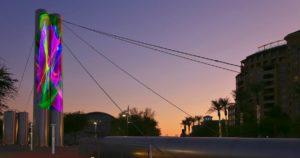Several Ideas for Reform
About two decades ago Scottsdale started suffering from a reputation that it was anti-business. There were several reasons for the perception, real and perceived. The City Manager at the time was pre-disposed against business. And while the Mayor then learned that the top job at the city is different than being one of six on a city council her nature was cautious. There was also a powerful citizen’s group, largely concentrated in the north, that had both bark and bite.
The marketplace took notice and avoided Scottsdale when it could. Some cheered the dynamic but the learned understood the long-term consequences. ASU was even brought in to analyze the situation, authoring a notable work called “Which Way Scottsdale?”
It took the approval of the Scottsdale Waterfront to remind the market that the city could still do bold and interesting things. That pro-business slant has largely served Scottsdale well ever since. Indeed, voters who think Scottsdale is headed in the “right direction” as opposed to the “wrong track” is at a nearly 30 year high. That’s a key reason why the recent bond election fared so well.
Yet, civic activism is alive and well. The populace rightly rose up against the ridiculous Desert Discovery Center and more recently but with less merit submitted an impressive number of signatures against the Southbridge II project in downtown Scottsdale.
We don’t mean to suggest this is a bad thing. Just the opposite. An engaged citizenry enriches community, in Scottsdale and elsewhere. And it reminds us that while Scottsdale should always maintain a pro-business posture for all the obvious reasons and benefits, it doesn’t mean it shouldn’t be more pro-resident too.
We have several ideas in this regard.
First, why does city planning staff make “recommendations” for denial or approval? Is that really their place? Or is it their job to say applications are “compliant” and identify positives and negatives for the policy makers – Planning Commissioners and City Councilmembers – to decide? Too often Planning Departments are revolving doors with the real estate industry leaving any developer with an advantage over an impacted neighborhood or area.
Second, the Arizona State Legislature is prohibited from accepting certain donations from special interests while it is in session. So why should a developer or special interest be allowed to give to the campaign of a Mayor or City Councilmember while its issue or application is being reviewed? The City of Los Angeles is even moving to ban developer donations. This may or may not go too far but Citizen’s United and other maneuvers by a Republican legislature in this state necessitate ongoing consideration of campaign contribution reform. That’s why we are enthusiastic supporters of former Arizona Attorney General Terry Goddard’s “Outlaw Dirty Money” initiative. It came close to making the statewide ballot in 2018. We hope it does in 2020.
Finally, most every City Council meeting, in Scottsdale and elsewhere, is lopsided in favor of the developer. When there is no controversy that is not a problem. But when present it is a bit like a plaintiff getting to make more arguments in front of a jury than the defense. Developers get more time and even an opportunity to rebut citizens. That’s fair but shouldn’t citizens get that right too. Since the State Legislature largely eviscerated the ability of adjoining property owners to file legal protests why not permit a certain concentration of residents living within a certain area of a development to file an “equal time” notice with city officials allowing that effected area to have the same amount of time to make its case before a council? If the project is good and compelling it will survive and may even thrive with further discussion. Look at how Museum Square in Scottsdale turned out, for example.
There will always be a certain segment of the electorate that is just crazy. And you wonder why they live in the cities they do. But then there are members of the responsibility caucus, never fearful of riling things up but also realizing that conversation and collaboration can also lead to a good place. In Scottsdale, count people like Jason Alexander, Betty Janik, Sonnie Kirtley, Copper Phillips and numerous others as such conscientious critics. They are people who realize that pro-resident and pro-business don’t have to contradict each other. Scottsdale should never go back to the way it conducted business in the early 2000s, even at one time almost driving Barrett-Jackson out of town. But it can enact common-sense citizen-oriented reforms that raise an important bar for all.

